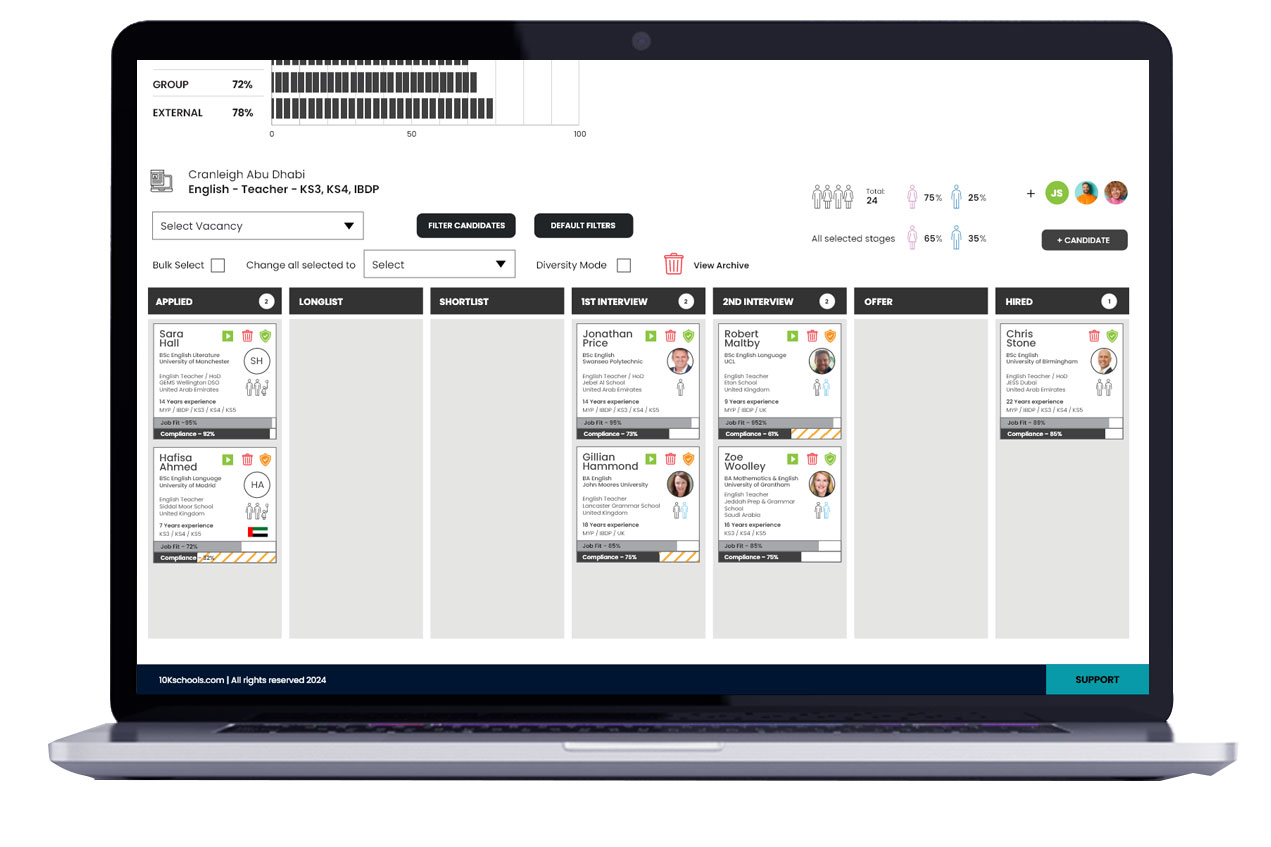Beat the global teacher shortage
Augment leadership Intuition with AI driven talent analytics
Data driven insights remove guesswork from critical HR processes

SELECT
SMARTER
ELIMINATE
BIAS
MEASURE
ENGAGEMENT
ENHANCE
RETENTION
AUTOMATE
HR ADMIN
In the face of a global talent shortage in education, schools can turn a shortage situation to their advantage, adapt and thrive through innovative HR practises. Data driven talent insights helps school leaders move from purely intuition-based to balanced, evidence-based decisions.
JOIN 10K SCHOOLS AND GIVE YOUR SCHOOL AN UNASSAILABLE ADVANTAGE IN THE WAR FOR TALENT
LETS FOCUS ON WHAT WE CAN TRULY INFLUENCE
THE THINGS SCHOOL LEADERS
CAN’T INFLUENCE
IN THE NEXT 3 HIRING CYCLES
#TEACHING GRADUATES
#TEACHERS LEAVING THE PROFESSION
FLEXIBLE WORKING
A school leader’s primary objective is to achieve sustainable outcomes for the school stakeholders.
Waiting for national or global action that is not going to solve a school’s talent challenge in the next few years
THE THINGS SCHOOL LEADERS
MAY INFLUENCE
IN THE NEXT 3 HIRING CYCLES
PAY
BENEFITS
WORKLOAD
While we can push for improvements in pay and benefits, schools have to work within economic constraints.
Increasing pay and benefits is a lever that cannot be continuously exercised, it’s neither effective nor sustainable in the long term to just ‘buy talent’
THE THINGS SCHOOL LEADERS
CAN INFLUENCE
IN THE NEXT 3 HIRING CYCLES
HOW WE SHORTLIST
HOW WE SELECT
HOW WE ENGAGE AND RETAIN
An increased focus on the science of people management enables schools to compete sustainably.
In the absence of widespread world-class HR practice in education, schools who take the lead in this area stand to gain a significant competitive advantage
While the wider discussion on the teacher shortage crisis is critical to the future of education, school leaders must always remain aware that the primary purpose of their role, is to chart their school’s path through uncertainty to ensure delivery of academic objectives.
The greatest school leaders succeed by focusing on solutions to seemingly ‘intractible’ problems for their school, rather than dwelling on the things we can’t influence.
Where the greatest school leadership minds of today must focus, is on new ways of selecting, engaging and generally leading our people through this time of uncertainty.
LETS SOLVE THE PROBLEM TOGETHER
AND ELEVATE TALENT MANAGEMENT IN EDUCATION TO NEW HEIGHTS
The 10k Schools Talent Analytics & HR Automation platform enables school leaders to apply targeted, strategic HR interventions to KNOW YOUR PEOPLE better, and navigate the global talent crisis.
We enable schools to do more with less, supported by powerful talent analytics insights previously only available to industry giants.
Our AI driven insights become more powerful the more schools join our mission.
Join us today!
10K SCHOOLS MAKE IT EASIER TO...
SELECT
Uncover the hidden talent in your job boards
Automate shortlisting across TES, Teach Away or any other job platform
Identify hidden motives, values, to achieve ‘TRUE BEST FIT’ for your school
ENGAGE & RETAIN
Evaluate & externally benchmark workforce engagement
Predict ‘At Risk’ segments of your workforce at high turnover risk
Review and refine your HR strategy through data insights
SAFEGUARD
AI driven background checks and self populating Single Central Record
Continuous revalidation of employee credentials and adverse media checks
Achieve the global platinum safeguarding standard of IDCVA
 In a world first for education, we create success profiles that will change how you hire or even promote, forever. What does this mean?
In a world first for education, we create success profiles that will change how you hire or even promote, forever. What does this mean?
We use psychometric evaluations of your existing team, identifying the hidden traits, motives and values that can help predict high performing candidates in the context of your specific school. tailoring the competencies to those which specifically impact your context. This isn’t about replacing your judgement, but allowing you to view the bigger picture and make even better selection decisions – usage of this game changing feature is unlimited and can be applied to every candidate in your job pools
 We’ve benchmarked and improved upon the most advanced candidate management systems, to simplify how you view candidate profiles from adverts across TES, Teach Away, LinkedIn or any other job board your school uses. Standardising the candidate profile data enables 10k Schools to make shortlisting a breeze – effortlessly evaluating a candidate pool of hundreds to leave only the ones who meet your job requirements.
We’ve benchmarked and improved upon the most advanced candidate management systems, to simplify how you view candidate profiles from adverts across TES, Teach Away, LinkedIn or any other job board your school uses. Standardising the candidate profile data enables 10k Schools to make shortlisting a breeze – effortlessly evaluating a candidate pool of hundreds to leave only the ones who meet your job requirements.
The time saving across all your school’s jobs, of this way of working has to be seen to be believed!
 Unlimited access to the world’s most advanced automated screening and ongoing workforce compliance monitoring tools from the International Digital Credential Verification Agency. (IDCVA)
Unlimited access to the world’s most advanced automated screening and ongoing workforce compliance monitoring tools from the International Digital Credential Verification Agency. (IDCVA)
This ensures your school has an unprecedented defence against those unsuitable to work with children or those seeking to hide problematic references or adverse media. As the inputs are automated, managing your Single Central Register becomes a breeze – because it’s impossible to make a mistake.
 We perform annual global Employee Engagement surveys across all our schools.
We perform annual global Employee Engagement surveys across all our schools.
This enables school leaders to not only see workforce perspectives and areas for organisation development, but external benchmarking the results across all other 10k Schools allows you to understand how your school compares vs peers.
This is a world first for education, giving evidence-backed insights into the areas school leaders and HR need to focus on not just to enhance retention internally, but to outperform peers and enhance reputation externally.
 With 10k Schools, we don’t restrict or meter usage of these game changing tools
With 10k Schools, we don’t restrict or meter usage of these game changing tools
Everything you see plus unlimited seats (users) and tech support, is included in a single annual subscription.
Our mission is to ensure schools have equal access to the most advanced tools, so we can help all schools elevate their capabilities in the fight against global teacher shortages, and keeping children safe in education.
